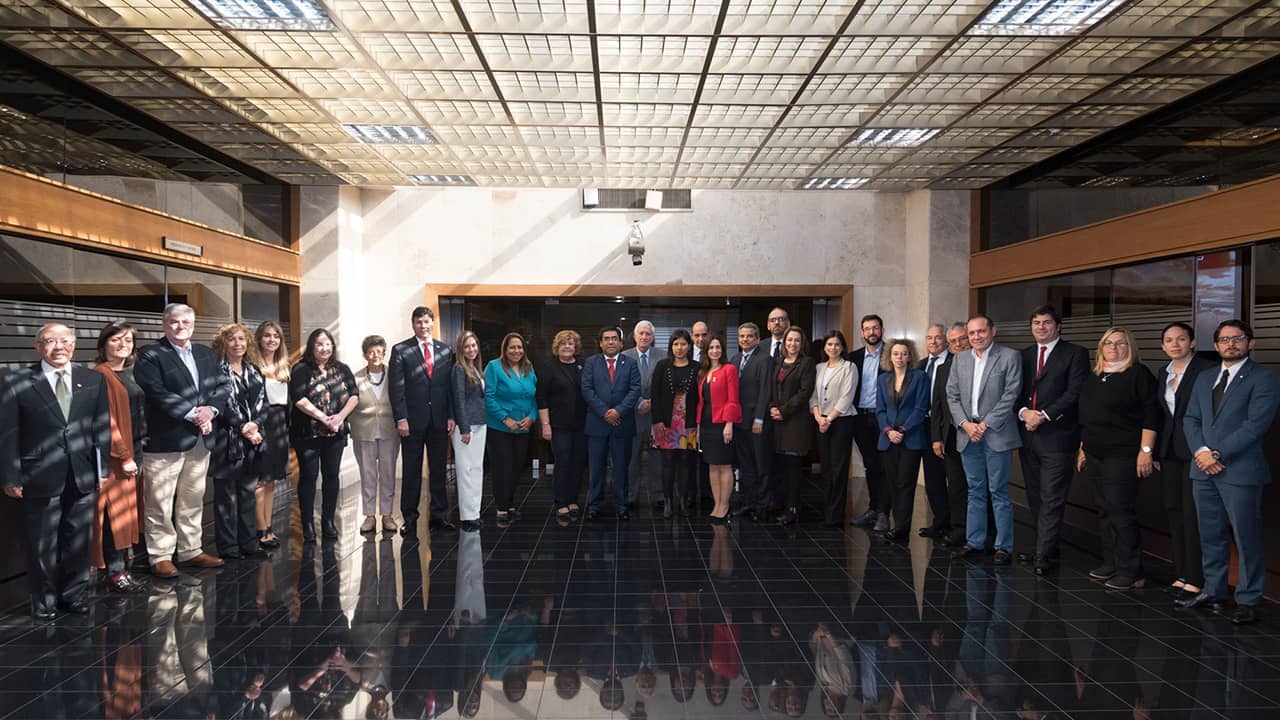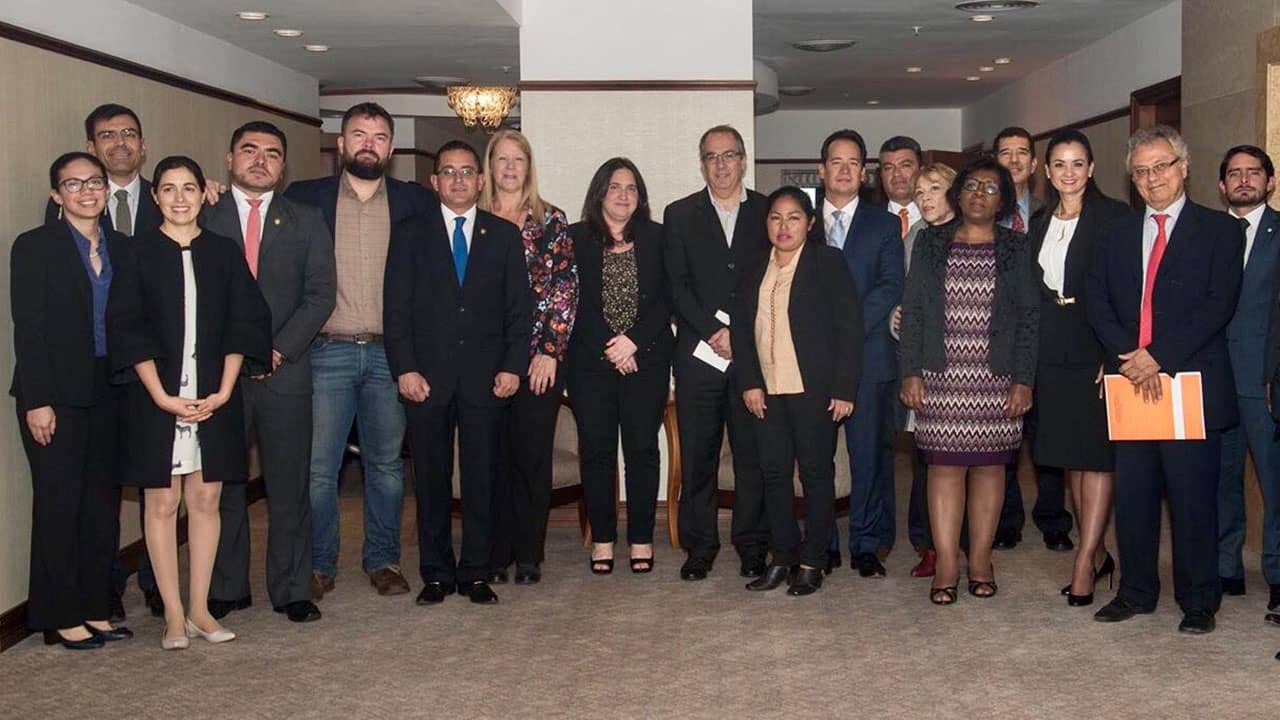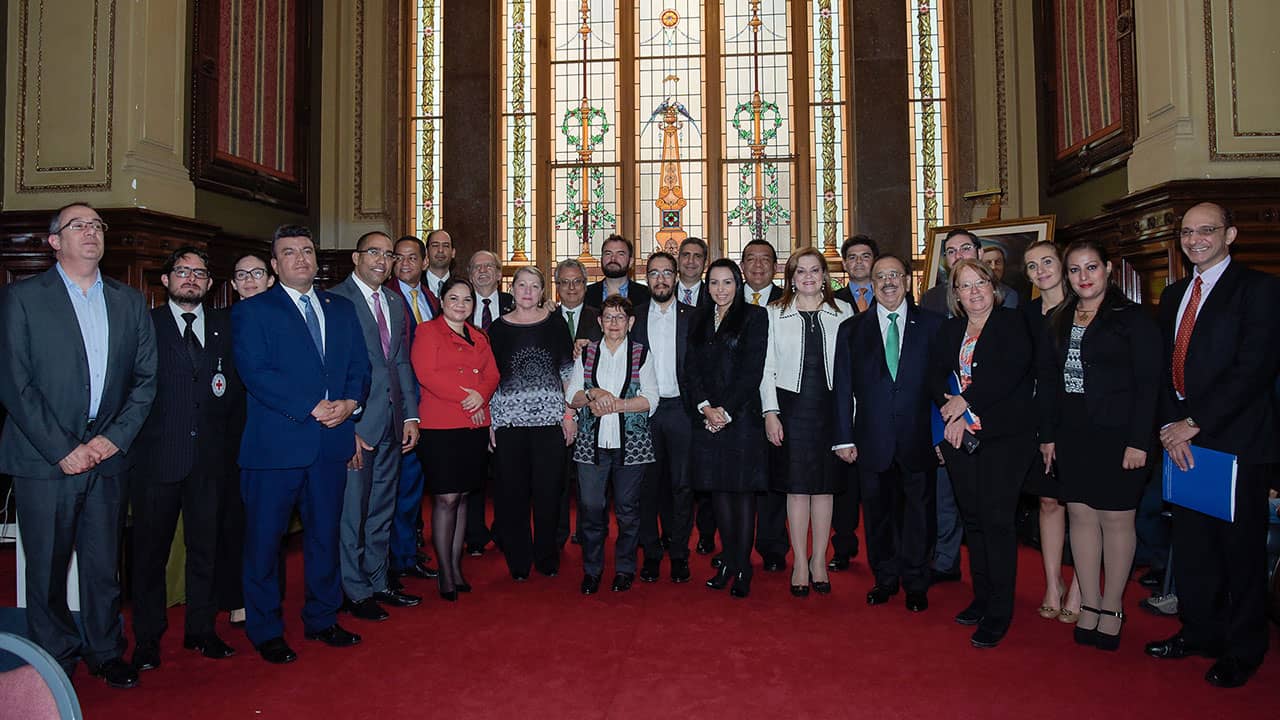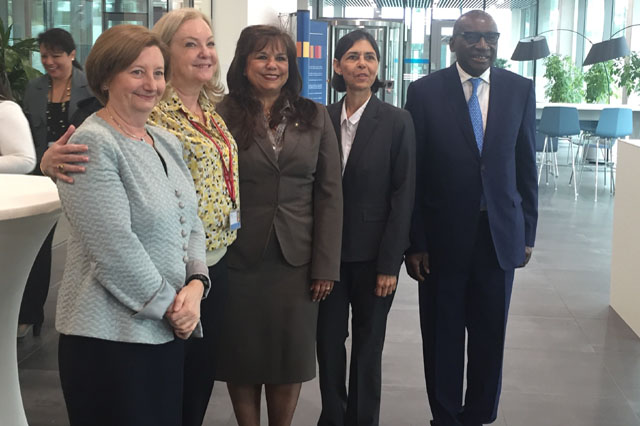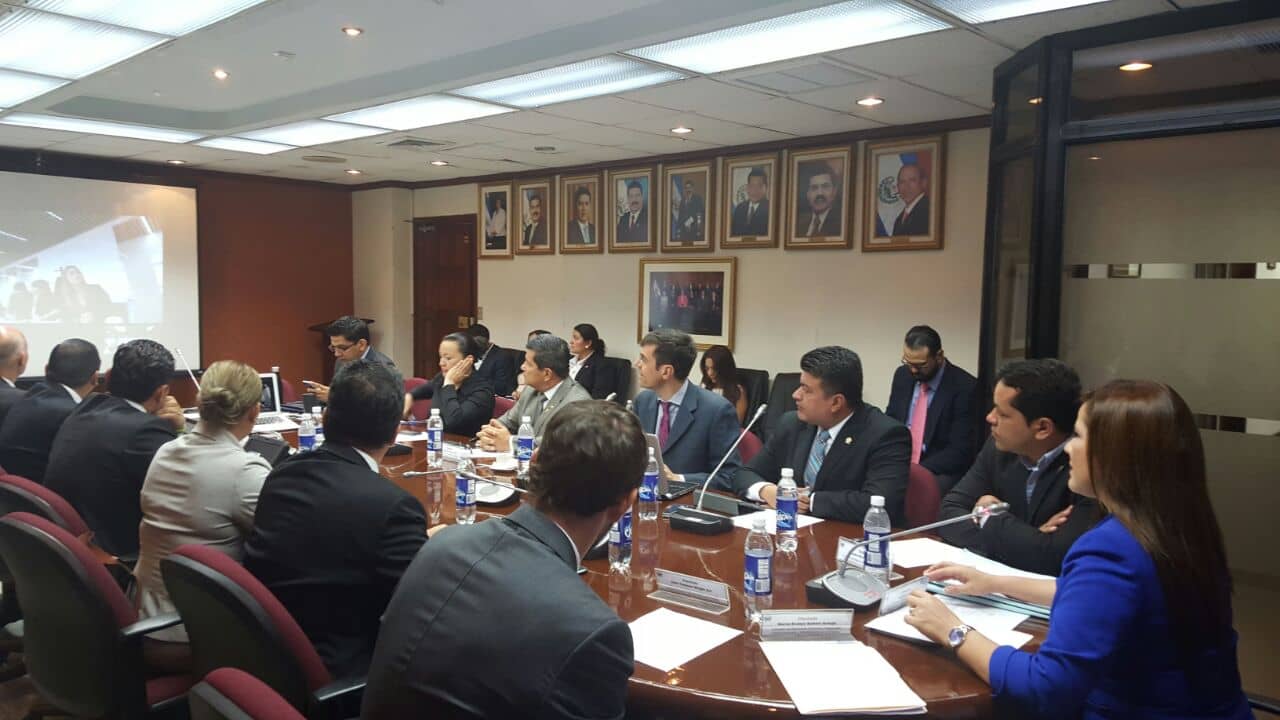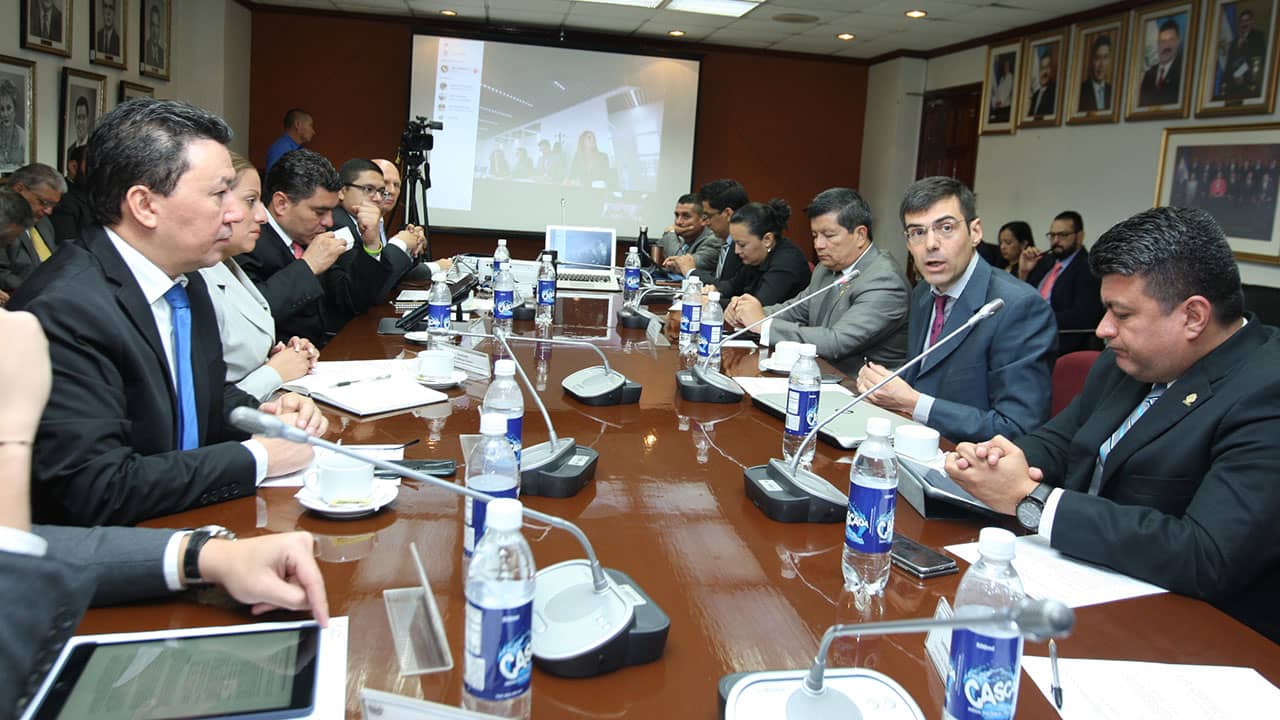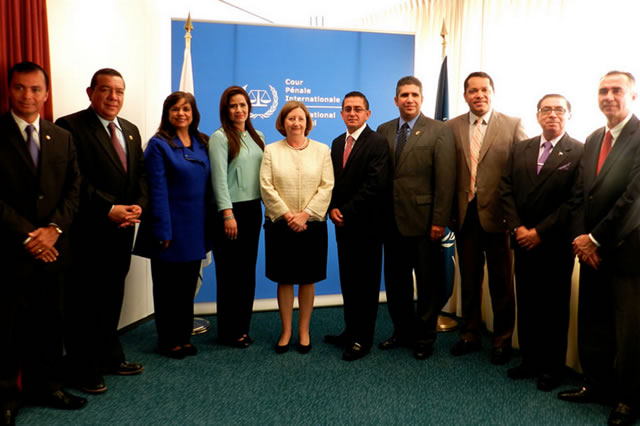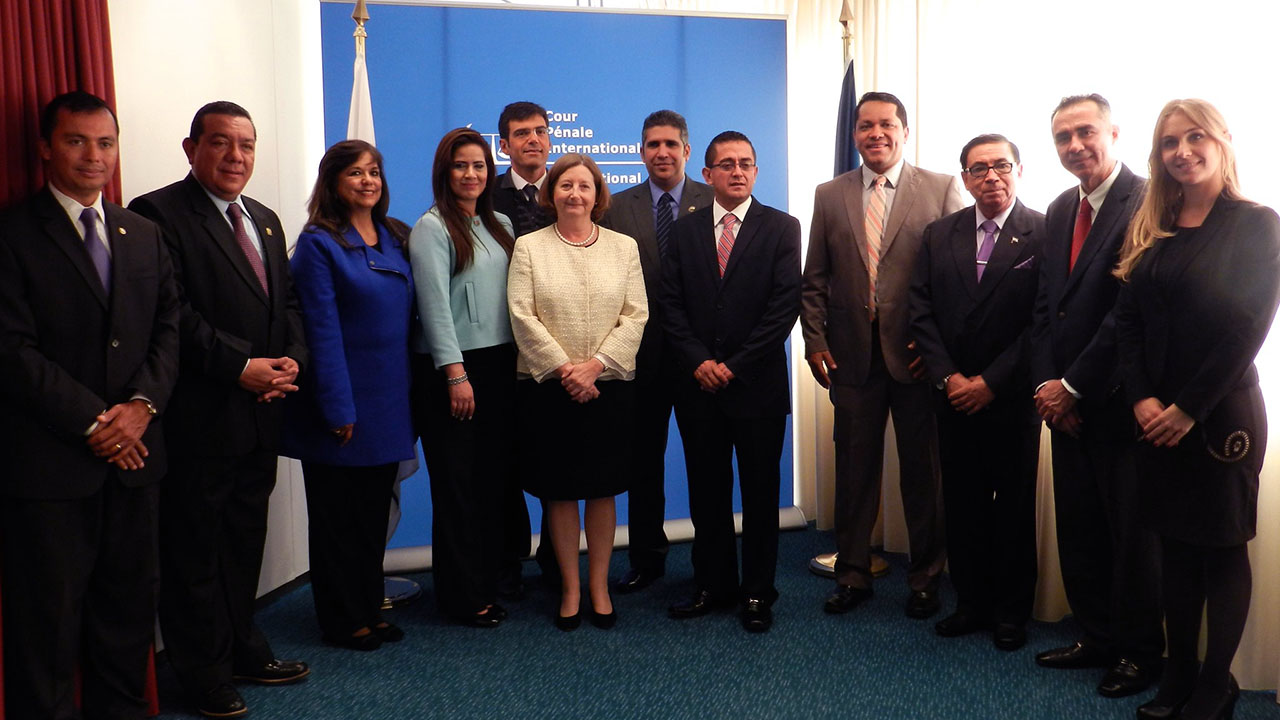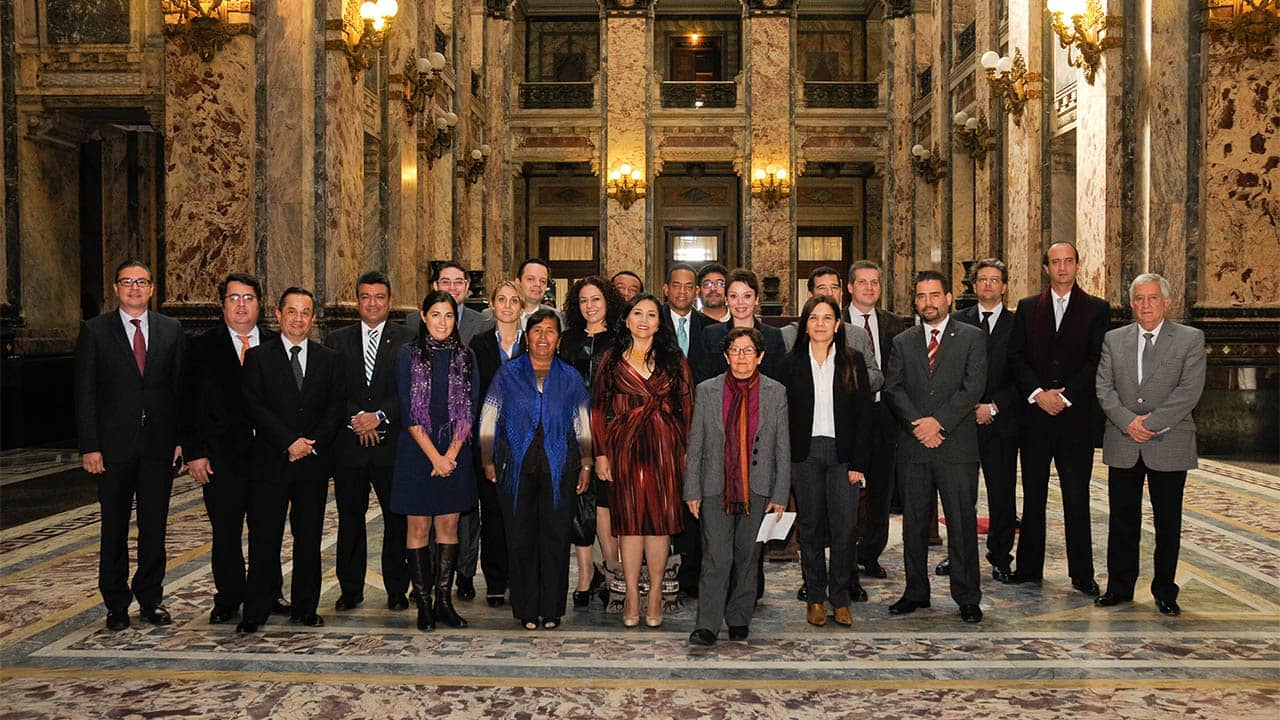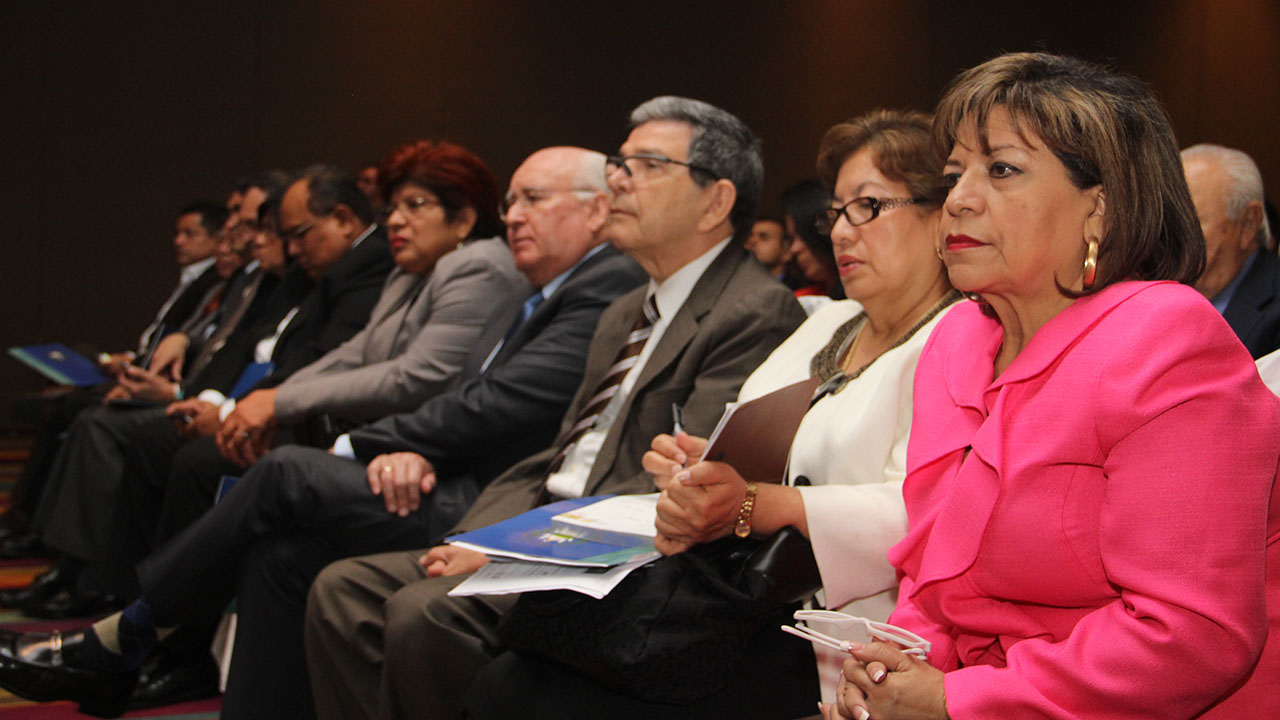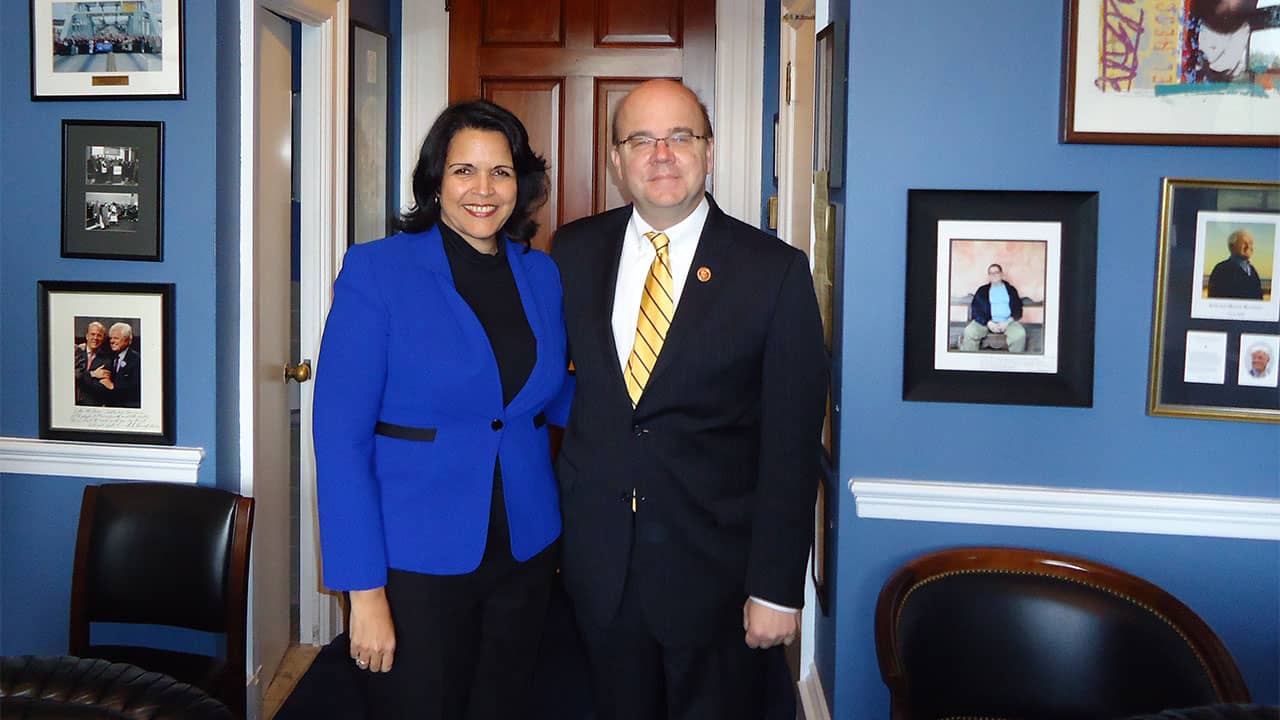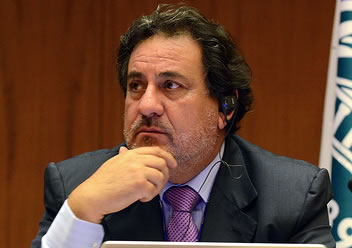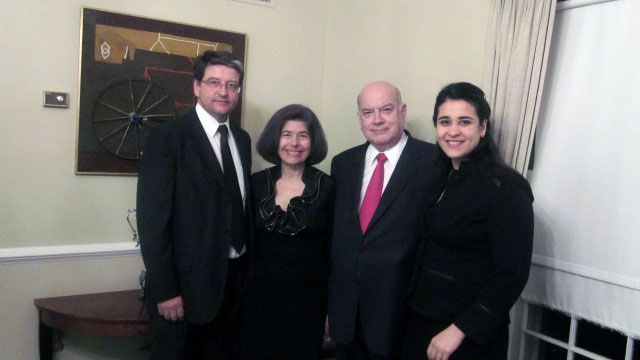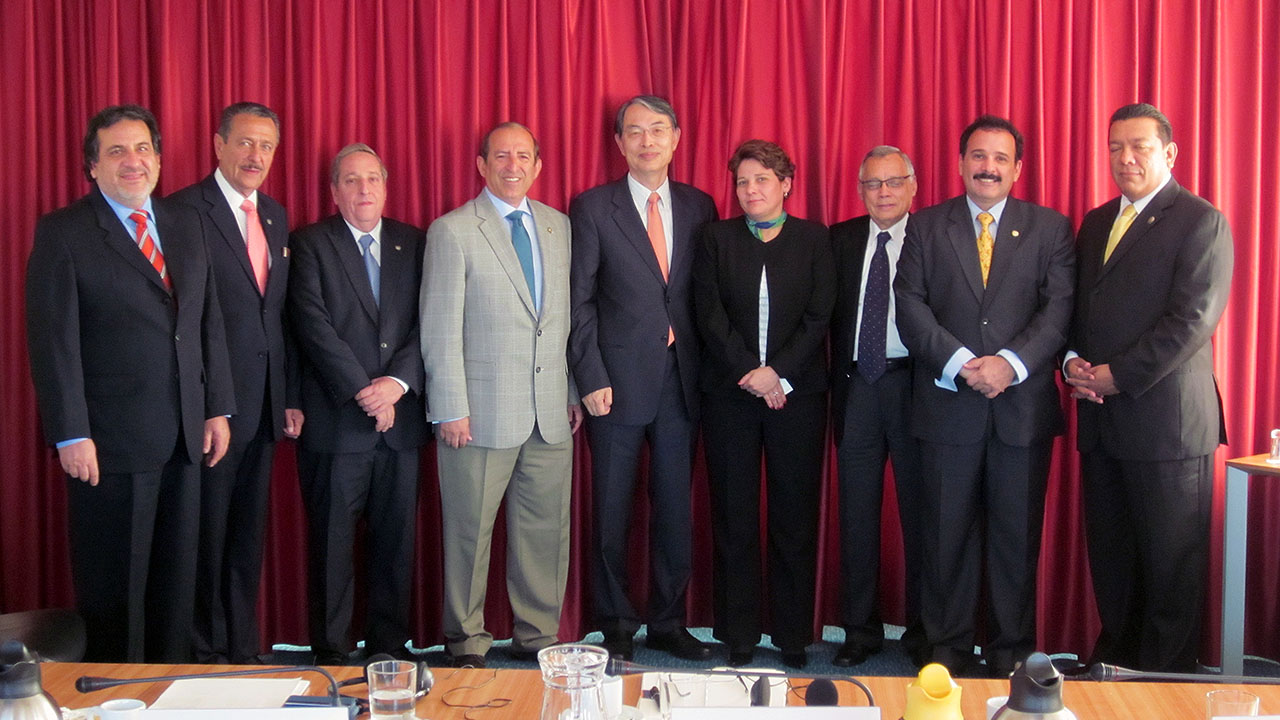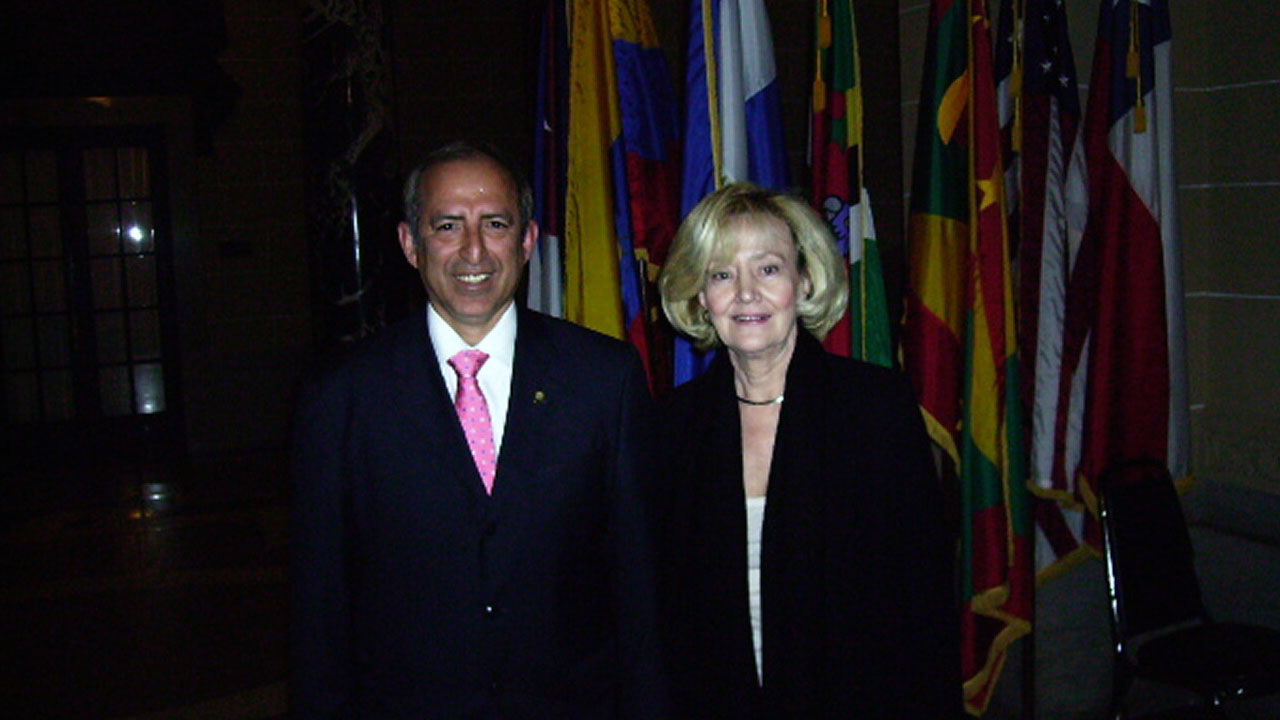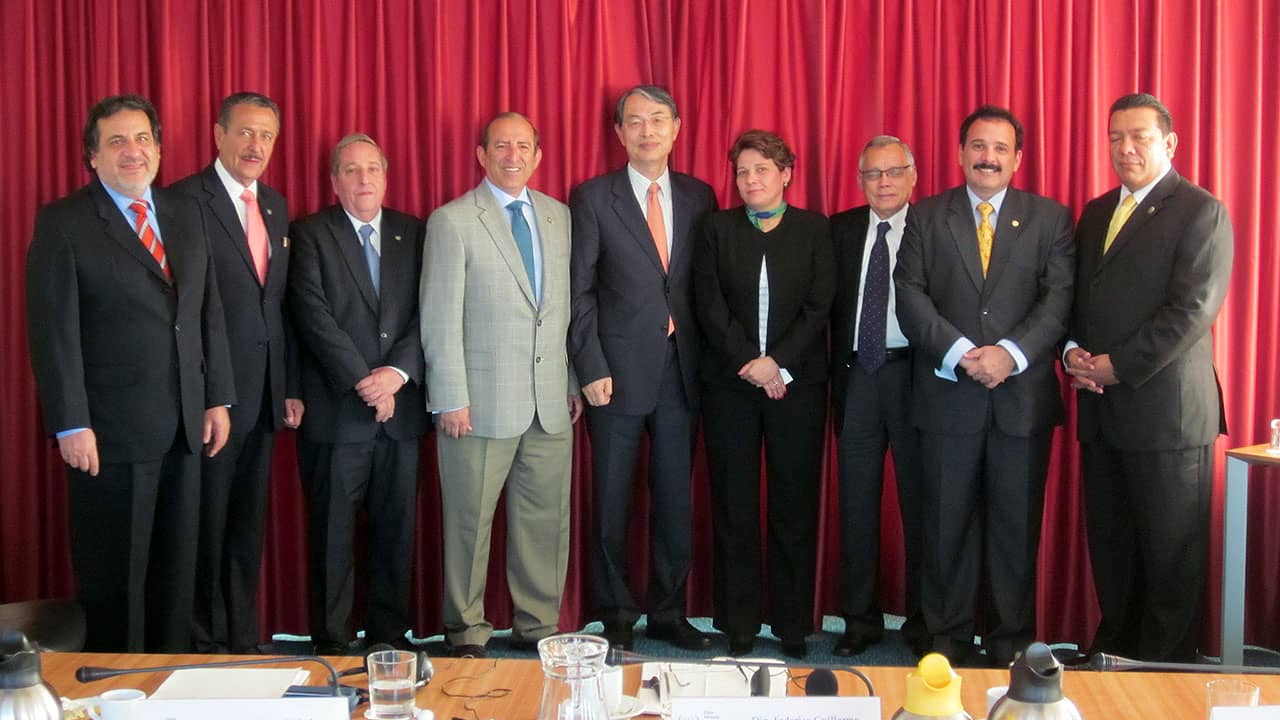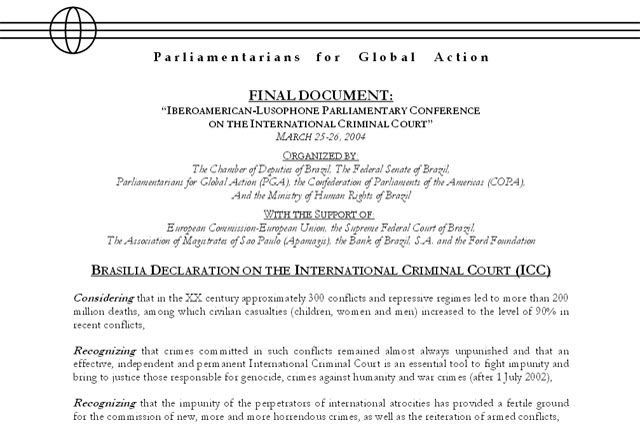Since 2002, Parliamentarians for Global Action has been working on El Salvador’s accession to the Rome Statute. The involvement of PGA in El Salvador has aimed at creating a multi-partisan network of Salvadorian Parliamentarians to promote the fight against impunity for the most serious international crimes, to support the ICC and to mobilize the parliamentarians in order to complete the steps for accession to the Rome Statute and its subsequent full implementation.
Since 2002, Parliamentarians for Global Action has been working on El Salvador’s accession to the Rome Statute. The involvement of PGA in El Salvador has had the aim of creating a multi-partisan network of Salvadorian Parliamentarians to promote the fight against impunity for the most serious international crimes, to support the ICC and to mobilize the parliamentarians in order to complete the steps for accession to the Rome Statute and its subsequent full implementation.
As an example of PGA’s actions, it is worth mentioning the mission conducted under the leadership of Senator Julio Cesar Valentin, former President of the Senate of the Dominican Republic, where PGA members were received by the Legislative Assembly of El Salvador and met several Salvadoran leaders and actors, including leaders of political parties and the Archbishop of San Salvador in September 2009. During the visit, which was motivated by the objective of PGA to promote the universality of the Rome Statute, all Salvadorans political parties expressed support and interest in the establishment of an international system based on law and not on force, as well as to ensure that the atrocities experienced during the tragic civil war in El Salvador would never happen again. In September 2010 and September 2015, prominent multi-party delegations of Salvadorian leaders visited the ICC and other institutions in The Hague upon invitation of PGA: These projects reinforced the commitment and engagement of MPs on the ICC process.
PGA members in El Salvador and worldwide have kept reaching out to El Salvadorian decision-makers to increase political support for the ratification process. Other actors, such as the EU and the ICC Presidency, have also enhanced dialogue and advocacy on the Executive branch (see below chronology of actions). Supporting this national decision-making process is one of the top priorities of PGA.
After an open letter written by leading Latin American PGA members to President Funes encouraging him to send the ratification Bill to parliament before the end of his presidential period, on 21 May 2014, the ICC Accession and Implementation Bills were sent to the Legislative Assembly of El Salvador for its consideration.
These PGA actions, alongside vibrant mobilization of Civil Society and other stakeholders, contributed to create multi-partisan support for the ICC Dossies when the accession bill was approved on Monday 24 November 2015 in the Foreign Affairs Committee presided by PGA member Dip. Karina Sosa. Three days before the 37th session of the PGA Annual Forum, held in San Salvador, and under the leadership of Deputy-Speaker Guillermo Gallegos, Dip. Mario Tenorio, Dip. Karina Sosa and Dip. Reynaldo Cardoza, the plenary approved, on 26 November 2015, the accession bill with 44 votes out of 83. This decision paves the way for El Salvador to become the 124th State Party to the Rome Statute.
On 22 December 2105, the Legislative Assembly of El Salvador published in the Official Gazette the Decree n° 197 on the approval of the Ratification of the Rome Statute and its amendments.
Rome Statute and Kampala Amendments of 2010
El Salvador participated in the 1998 Rome Conference where the International Criminal Court (ICC) Statute was adopted.
A delegation from El Salvador also attended the 2010 Review Conference in Kampala where the amendments on the crime of aggression and on the use of certain weapons in armed conflict not of an international character were adopted.
El Salvador deposited the instruments of ratification on 3 March 2016 becomming the 124th State Party to the Rome Statute of the International Criminal Court (ICC).
Status on Domestic Implementation of the Rome Statute
El Salvador has incomplete, pre-existing legislation on the crimes of the Rome Statute – genocide has been defined and there are partial definitions of war crimes. Crimes against humanity, as defined under the Rome Statute, have not been incorporated in the criminal code and El Salvador has yet to incorporate general principles to enable its domestic tribunals to exercise its primary responsibility to investigate and prosecute the most serious crimes under international law. Furthermore, there is still no legislation on procedures to cooperate with the ICC on eventual investigations or prosecutions at the international level, including enforcing warrants of arrest against ICC fugitives.
On 21 May, 2014 the Parliament of El Salvador received, from former president Funes, the Bill on implementation of the Rome Statute. On Thursday 22 May 2014 the bill was formally introduced and presented to the Plenary of the Legislative Assembly and was subsequently transmitted to the International Relations Committee to be considered. After approval at the Foreign Affairs Committee the Bill will be analyzed in the Plenary.
Agreement on Privileges and Immunities of the Court (APIC)
El Salvador has yet to accede to the APIC.
Additional Agreements
On 25 October 2002, President Calderon signed a Bilateral Non Surrender Agreement to the ICC with the United States and on 29 April 2004, the National Assembly ratified Bilateral Non Surrender Agreement to the ICC with the United States.
ICC PROCESS IN EL SALVADOR and PGA involvement
Since 2002, PGA has been working towards ratification of the Rome Statute by El Salvador, with the help of FMLN politician Mr. Shafick Handal, MP, who joined PGA that same year.
In 2005, the Central American Parliament (PARLACEN) made a huge step forward by adopting and transmitting to the Assembly of El Salvador the Resolution AP/3-CLXXI-2005, calling its congress members to ratify the Rome Statute. Unfortunately this initiative was not followed by the Congress.
But when a delegation of MPs from El Salvador attended PGA Seminar on the ICC and implementing legislation in the Mexican Senate, El Salvadorian Lawmakers from the opposition communicated that the Government did not support progress on the ICC dossier.
The arrival of Mauricio Funes in government in June 2009 produced a favorable change in the foreign policy of El Salvador in relation to the International Criminal Court (ICC) since the ratification of the Rome Statute of the ICC was included in the Government platform. Since then, many Parliamentarians and government officials from Latin American countries, as well as countries in other regions of the world, visited El Salvador and engaged with the government officials and parliamentarians to promote the ratification of the Rome Statute.. Several actors in the country started to mobilize for this goal, and MPs started to work in a coordinated manner with the assistance of the Campaign for the Rome Statute of the ICC.
From 24-25 September 2009, and upon the invitation of the Vice-President of the National Assembly of El Salvador, Dip. Sigfrido Reyes, (PGA Member), a Delegation of Parliamentarians for Global Action visited the National Assembly of El Salvador in San Salvador and had fruitful exchanges with high level representatives of almost all political groups, while meeting also with representatives from the Government and the Judiciary so as to promote the country's accession to the Rome Statute of the International Criminal Court.
In November 2009, further progress was realized when El Salvador reported to the UN Human Rights Council the beginning of consultations to facilitate the eventual ratification of the Rome Statute. That same month, during the ASP session in The Hague, the Ambassador of El Salvador to The Netherlands delivered a very supportive speech towards the system of the ICC.
The following year, President Funes continuously showed support to the ICC and the will to work towards ratification of the Rome Statute. In January 2010, on the occasion of the Anniversary of the signature of the Peace Accords, President Funes acknowledged the responsibility of the State for the serious crimes committed during the conflict and apologized to the victims, while committing the country to effective investigations and prosecution of those crimes.
On January 27, 2010, Dip. Sigfrido Reyes (El Salvador, Deputy Speaker) intervened at the OAS special session on the ICC on behalf of PGA in order to share with OAS member States the position of PGA with respect to the various items in the agenda for the Review Conference of the Rome Statute set to take place in Kampala in May-June 2010. On this occasion, he notably reaffirmed the importance of the ratification of the Rome Statute as a mechanism of redress and reparation to the victims of the civil conflict, and as a guarantee of no repetition of those crimes.
In February 2010, facing the length of the process of ratification, PGA sent a letter to the Parliament and Government of El Salvador regarding the mistakenly perceived incompatibility between the Rome Statute and El Salvador’s Constitution on the matter of life sentences. The note concluded that the Constitution of El Salvador does not need modification to proceed with ratification, and suggested the use of article 103.1 of the Rome Statute at the moment of ratification.
From 17 to 19 of February 2010, the Salvadorian Ministry of Foreign Affairs hosted a high level Seminar on the ICC geared towards addressing some of the main concerns delaying the ratification process in the country. The meeting brought together very high ranking authorities in the country, particularly in the judicial sphere, as well as many key actors of the civil society (coordinated by the CICC), the military and the academia.
In April 2010, Ambassador Christian Wenaweser, President of the Assembly of States Parties, conducted a mission to El Salvador upon invitation by the Ministry of Foreign Affairs to promote the ratification of the Rome Statute. Later that month, Dip. Sigfrido Reyes intervened on behalf of PGA at the ASP Panel on the Review Conference at the UN, reminding the importance for El Salvador of engaging in the process of ratification.
In May 2010, El Salvadorian MPs from FMLN and GANA started showing more interest in the ICC by attending the PGA´s Consultative Assembly of Parliamentarians for the ICC and the Rule of Law at the Ugandan Parliament.
At the first Review Conference of the Rome Statute in May-June 2010 (Kampala, Uganda), a delegation from El Salvador was present and PGA convened a meeting between US Delegate Ambassador Rapp and the head of delegation from El Salvador, Dr. Morales, with the understanding that existing good relations between the US and El Salvador might have not been affected in case of ratification of the Rome Statute by El Salvador. Later that month, El Salvador did not include the commitment to the ratification of the Rome Statute in its report to the UN Human Rights Council under the Universal Periodic Review (UPR).
From 5 to 8 September 2010, a multi-party delegation of MPs from El Salvador visited the ICC in The Hague: The aim of the mission was to follow-up on the commitments of political leaders expressed during the field mission of PGA to San Salvador in September 2009. All high level MPs had fruitful interactions with the ICC Organs and stakeholders, and committed to promote and support the transmittal of the ICC bill by the Executive to Parliament.
PGA undertook several actions in September 2010 in order to facilitate the accession of El Salvador to the Rome Statute. For example, PGA prepared a memo for the European Union on the legal interpretations and/or political solutions to avoid a lengthy constitutional amendment process. PGA also sent a letter to the Brazilian Ambassador M. Biato, asking for the support of Brazil to promote El Salvador’s acceleration of the accession process.
Noting the continuous absence of progress towards ratification of the Rome Statute, in September 2011 PGA re-launched its active campaign on the ICC in El Salvador, starting with the presentation of a Strategic Document to overcome obstacles and allow El Salvador to ratify the Statute of Rome without further delays. The proposal included a plan for negotiation in the National Assembly of a "Declaration on the applicability of the Rome Statute in El Salvador", which could have been incorporated into a law.
On the occasion of a visit from a PGA delegation to El Salvador in September 2011, the Speaker of the Parliament (Mr. Reyes) called the Executive for the prompt transmission of the ICC Accession to the Parliament itself. Some components of the opposition (e.g. the right wing movement GANA) told to the PGA delegation, led by Belgian Dep. Alain Destexhe, that they would be ready to vote in support of the ratification.
On 14 October 2011, PGA's Deputy Convenor, Dip. Minou Tavarez Mirabal and Sen. Julio Cesar Valentin (Dominican Republic) met the former President of El Salvador and current leader of the GANA political group, Mr. Saca, in order to discuss the importance to support the ICC dossier.
Dip. Sigfrido Reyes, President of the Legislative Assembly of El Salvador and PGA member, gave a speech on 18 January 2012, to mark the 20th Anniversary of the Chapultepec Peace Accords. He made a special reference to the massacre at El Mozote, and reminded the importance of international treaties in the protection of social and cultural rights, insisting on the treaties that still need to be ratified by El Salvador, namely the Rome Statute and the protocol of the CEDAW.
On 27 January 2012, PGA contacted the El Salvador and Guatemala Desk of the European External Action Service in Brussels suggesting an urgent EU involvement to continue the dialogue at presidential level in El Salvador, also as a follow up to the Guatemalan ratification.
On 30 January 2012, Dip. Minou Tavarez (Dominican Rep.) requested the Advisor on Strategy Matters of President Funes to convene all concerned agencies in a private meeting on the ICC at the Presidential House.
In April 2012, as a reaction to the recent ratification of the Rome Statute by neighboring country Guatemala, two PGA members from El Salvador, Dip. Mario Tenorio and Dip. Sigfrido Reyes made public statements reaffirming the importance for the country to ratify the Rome Statute without further delays. They particularly called on the President to submit the ratification bill for debate at the legislative branch.
In addition to PGA actions, throughout the year, President Song wrote letters to Heads of States, governments, and/or other relevant officials, in more than a dozen non-States parties, including El Salvador, urging consideration of joining the Rome Statute, outlining the benefits of ICC membership and clarifying some common misperceptions.
On 12 April 2012, the Minister of Foreign Affairs of El Salvador, Hon. Hugo Martínez, issued a statement indicating the willingness of El Salvador to proceed with the ratification of the Statute in the second-half of 2012. The statement, while welcomed, did not mention the necessary step required from the Executive branch, namely the transmittal of the ratification bill to parliament.
In order to understand the reasons why the process of ratification of the Rome Statute did not go forward in El Salvador, Amb. Tiina Intelmann, President of the Assembly of States Parties to the Rome Statute, met with Amb. Garcia Gonzalez on 21 February 2013, in order to discuss obstacles and possibilities to overcome them.
In 2013, PGA continued to mobilize Salvadorian MPs and urged third parties, including the EU and the UK Delegation at the UN General Assembly, to encourage ratification.
In early 2014, after monitoring no action from the Government of El Salvador and on the basis of relevant information received at the end of 2013 and in April 2014 concerning the unwillingness of the Office of the President of El Salvador to transmit the ICC Ratification Bill to Parliament, on 2 May, 2014PGA sent an open letter to the President of El Salvador, Mr. Funes, signed by some of the most prominent Latin American PGA Members as a way to encourage the President to transmit the Ratification Bill of the Rome Statute to the Legislative Assembly during his last month in office, namely May 2014.
The letter made the specific point that El Salvador is one of the few Latin American countries that has yet to become a party to the International Criminal Court. The ratification of the Rome Statute in El Salvador is not only politically possible, it is also strongly supported by vast sectors of society as a moral mean of reparation for victims and a legal guarantee of non-repetition of the crimes that they have suffered during the civil war. Moreover, through the letter PGA stressed that the acceptance by El Salvador of the new system of international justice established by the Rome Statute of the ICC could be seen as an important political and symbolic move, even if such a ratification is completely independent from the issue of accountability for past crimes given the non-retroactive nature of the ICC which was one of the main issues that Parliamentarians form right wing parties had raised when discussing the ICC in different PGA actions in The Hague and in El Salvador in 2007, 2009, 2010 and 2012.
Two weeks after such letter was sent and distributed in the local media, the Parliament of El Salvador received the ICC Ratification and Implementation Bills from the former president the Republic, H.E. Mauricio Funes.
On 23 and 30 June 2014, the Legislative Assembly of El Salvador together with the assistance of the PGA and the essential cooperation of the ICC, organized two Expert session on the Rome Statute with the aim of analyzing essential topics surrounding the Rome Statute such as the jurisdiction of the ICC, the crimes and the criminal principles contained in the Rome Statue, as well as the necessary implementing legislation to give full effect to the complementarity principle and the cooperation mechanism to fulfill the obligations under part 9 of the Rome Statute.
During the First Experts Session, ICC Judge, Silvia Fernandez de Gurmendi and former President of the Assembly of States Parties to the Rome Statute, Ambassador, Christian Wenaweser, provided the Legislative Assembly of El Salvador their unique legal and political expertise on the Rome Statute system. Bringing strong support of the global PGA membership to the deliberations on the ICC, PGA leading member Senator Julio Cesar Valentin (Dominican Republic) was also among the participating experts presenting particularly the benefits of ratifying the Rome Statute as well as his experience regarding the Rome Statute ratification process in Dominican Republic as a colleague parliamentarian form an neighboring county.
On 10 July 2015, under the leadership of PGA member, Dip. Ronny Monge (Costa Rica), PGA co-organized an Special Hearing on the ICC with the Parliament of Costa Rica where members of Parliament from Costa Rica and El Salvador strategized over progressing their respective processes of domestic implementation and ratification of the Rome Statute of the ICC. The key-note speech was delivered by the ICC President, Judge Silvia Fernández de Gurmendi, who expressed the importance of the Universality and Effectiveness of the Rome Statute and explained the main features of the ICC system, such as the prospective and non-retroactive outlook of the Rome Statute and the independence of the Court´s organs. Parliamentarians representing 4 political party groups of El Salvador had the possibility to express the obstacles to, as well as the opportunities for achieving the Rome Statute ratification in El Salvador. They committed to further disseminate the clarifications received from the President of the ICC as well as from the other participants in the Special Hearing to boost the ratification process in their country.
On 28th and 29th September 2015, PGA facilitated the visit of a delegation of parliamentarians from the Foreign Affairs Committee of El Salvador to The Hague in order to meet with the organs of the International Criminal Court (ICC), experts, diplomats and fellow parliamentarians to address lingering political and legal concerns and obstacles to achieve consensus or majority-support for the ratification of the Rome Statute. During the several meetings the Salvadorian parliamentarians from all political parties reaffirmed that the doubts that they had have been clarified and that they will act as multipliers of the information that they have receive from all the stakeholders and work towards a ratification in the coming weeks and months.
Relation to the ICC
As a member of the Organization of American States, El Salvador has supported the promotion of the International Criminal Court through the adoption of an annual resolution by the General Assembly of the OAS, as well as by the holding of a annual working meeting of high level within the Political and Juridical Affairs Committee of the OAS. PGA members have been invited at numerous occasions to this meeting. For more information on the work of PGA within the OAS, click here.
About PGA Membership and local support in the El Salvador
The PGA-El Salvador group is a multiparty group of parliamentarians from the National Assembly. Through this group, PGA has realized numerous strategic activities and actions in the El Salvador and abroad, designed to bring about the political will of the El Salvador MPs in support of the fight against impunity and the prevention of international crimes under the Rome Statute of the ICC.
MPs form El Salvador have notably been actively participating in several sessions of PGA’s Consultative Assembly of Parliamentarians for the ICC and the Rule of Law: II session in New York (2003), III session in Wellington (2004), V session in Santo Domingo (2008), VI session in Kampala (2010) and VII session in Rome (2012), where they had the chance to directly interact with the ICC organs, including the Prosecutor and the President.

